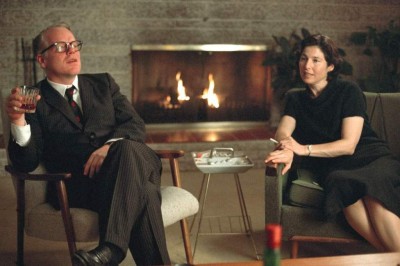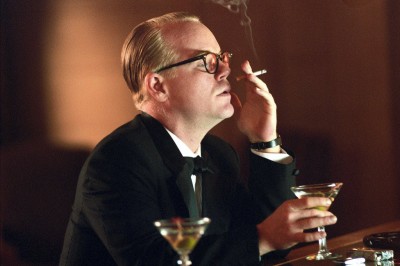
I have to admit that I admired Capote (2005) and Philip Seymour Hoffman’s performance more before I saw Toby Jones’ performance as Capote in Infamous (2006), which covers almost exactly the same ground. That said, Capote is a good film, though it is a film that keeps the viewer at arm’s length, offering a chilly, almost wholly cerebral look at Capote and the act—and cost—of writing. Bearing that in mind, Hoffman’s measured, distanced performance is just right for the film that contains it. Whether it really is his greatest performance—it’s his Oscar winner, of course—is another matter and a personal call. But for anyone interested in Hoffman and his career, it’s clearly a must-see.

Here is an excerpt from my review of Capote, written before I had seen Infamous: Chilly, downbeat, thought-provoking, flawed and anchored to a wholly remarkable performance by Philip Seymour Hoffman, Capote is a hard movie to like—and an even harder one to ignore. It’s also possibly too ambitious for its own good.While the film simplifies matters by limiting itself to a specific six-year period in writer Truman Capote’s life (the research into and writing of In Cold Blood), it nonetheless tackles the hardest of all artistic endeavors to make cinematically interesting: writing. I can only think of two movies that have really pulled that off: the Coen brothers’ Barton Fink and David Cronenberg’s Naked Lunch.First-time narrative filmmaker Bennett Miller and actor-turned-screenwriter Dan Futterman have taken a different angle with Capote. They look less at the actual process of writing and more at the way an author develops a story—and the way that story in turn shapes the writer. Yet their film does share a common theme with Naked Lunch.It would be hard to imagine two more dissimilar films than the utterly fantasticated Cronenberg film and the comparatively naturalistic Capote. But the two movies are brothers under the skin in the concern over the effect of the material on the writer, and the inherent danger—to the writer and those in his sphere—of the very act of writing. Both films also sexualize writing, albeit in different ways.
Full review: Here
The Hendersonville Film Society will show Capote Sunday, Apr. 6, at 2 p.m. in the Smoky Mountain Theater at Lake Pointe Landing Retirement Community (behind Epic Cinemas), 333 Thompson St., Hendersonville.



Before you comment
The comments section is here to provide a platform for civil dialogue on the issues we face together as a local community. Xpress is committed to offering this platform for all voices, but when the tone of the discussion gets nasty or strays off topic, we believe many people choose not to participate. Xpress editors are determined to moderate comments to ensure a constructive interchange is maintained. All comments judged not to be in keeping with the spirit of civil discourse will be removed and repeat violators will be banned. See here for our terms of service. Thank you for being part of this effort to promote respectful discussion.